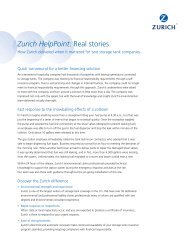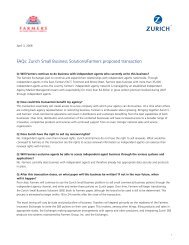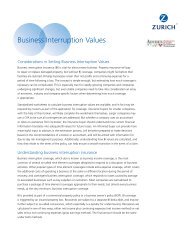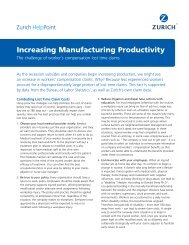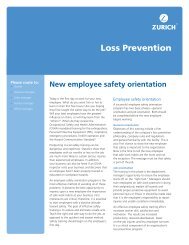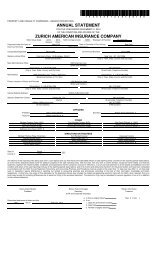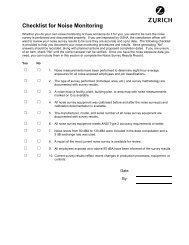Know the risks - Zurich
Know the risks - Zurich
Know the risks - Zurich
Create successful ePaper yourself
Turn your PDF publications into a flip-book with our unique Google optimized e-Paper software.
Compensation regulationsDepository institutions whose stock or <strong>the</strong> stock of <strong>the</strong>ir subsidiaries is publiclytraded are subject to new compensation disclosure rules adopted and enforced by<strong>the</strong> SEC. 32 The new rules are designed to provide investors with a clearer and morecomplete picture of <strong>the</strong> compensation of executive officers and directors, refinecompensation related disclosures, expand disclosures related to beneficial ownership,improve disclosures regarding related-party transactions, and consolidate existingdisclosure requirements regarding director independence and corporate governance.A company’s annual report must now include a Compensation Disclosure andAnalysis that discusses <strong>the</strong> material factors underlying <strong>the</strong> company’s compensationpolicies and decisions for executive officers.Privacy requirementsThe Gramm-Leach-Bliley Act sets forth requirements regarding an institution’s disclosureof <strong>the</strong>ir consumers’ non-public 33 financial information. 34 For example, all financialinstitutions must develop a privacy policy and disclose that policy to consumers. Afinancial institution may not disclose non-public personal information about consumersto nonaffiliated third parties, unless <strong>the</strong> financial institution has previously informed <strong>the</strong>consumer that such information may be disclosed and <strong>the</strong> consumer has been given<strong>the</strong> opportunity to direct that such information not be disclosed. States may enact (andenforce) even more stringent financial privacy protection.Enforcement actionsDirectors of depository institutions may be <strong>the</strong> subject of o<strong>the</strong>r administrative andcriminal sanctions, including:1. Cease and desist orders12 U.S.C. § 1818(b) authorizes <strong>the</strong> appropriate federal regulatory agency, afternotice and an administrative hearing, to issue a cease and desist order (which mayinclude requiring <strong>the</strong> respondent to take affirmative action to correct <strong>the</strong> violation)against any institution affiliated party who: (1) has engaged, is engaging, or <strong>the</strong>reis reasonable grounds to believe will engage, in any unsafe or unsound practice; or(2) has violated, is violating, or <strong>the</strong>re is reason to believe will violate, any law, rule orregulation or any written condition imposed by <strong>the</strong> agency in connection with <strong>the</strong>grant of an application or o<strong>the</strong>r request.32 SEC Release No. 33-8732.33 The privacy provisions under <strong>the</strong> Gramm-Leach-Bliley Act of 1999 do not apply to publiclyavailable information – i.e., titles to property,tax liens, bankruptcy filings and judgments– or to depersonalized information, such asdemographic data. Caution should be paid,however, when non-public information andpublicly available information are combined.34 A “consumer” is defined as an “individual whoobtains from a financial institution, financialproducts or services that are to be usedprimarily for personal, family, or householdpurposes.” 15 U.S.C. § 6809(9). The definitiondoes not extend to a financial institution’sbusiness customers.2. Removal, prohibition and suspension12 U.S.C. § 1818(e) provides that <strong>the</strong> appropriate federal regulatory agencymay initiate proceedings to remove an institution-affiliated party from office andto prohibit any fur<strong>the</strong>r participation by that party in <strong>the</strong> affairs of any insuredinstitution. Prohibition orders may be entered even where <strong>the</strong> institution-affiliatedparty is no longer affiliated with <strong>the</strong> institution. To issue a removal and prohibitionorder, <strong>the</strong> agency must determine: (1) that <strong>the</strong> institution-affiliated party has, directlyor indirectly, committed a violation of law, regulation, written agreement with orwritten condition imposed by <strong>the</strong> agency, or final cease and desist order, or hasparticipated in an unsafe or unsound practice or has committed a breach of fiduciary13Financial institutions guide



